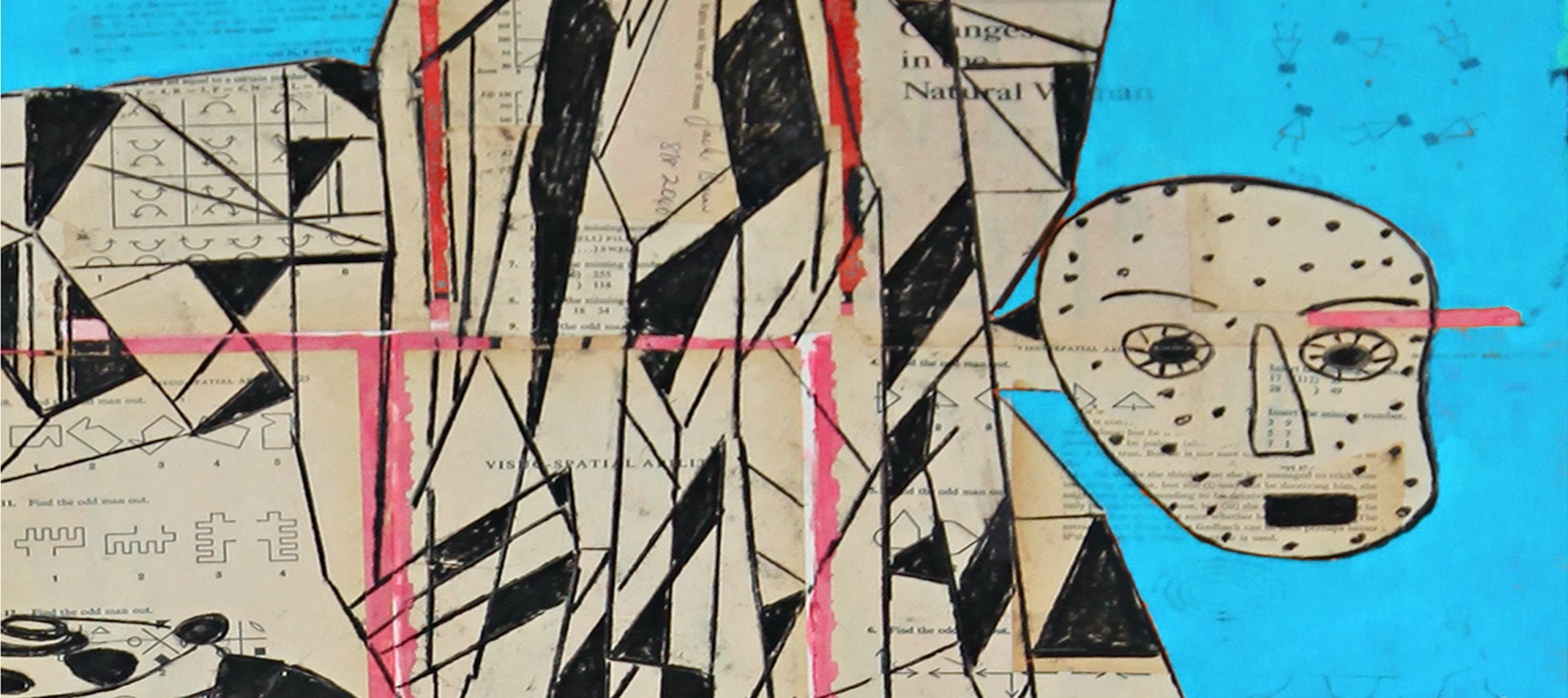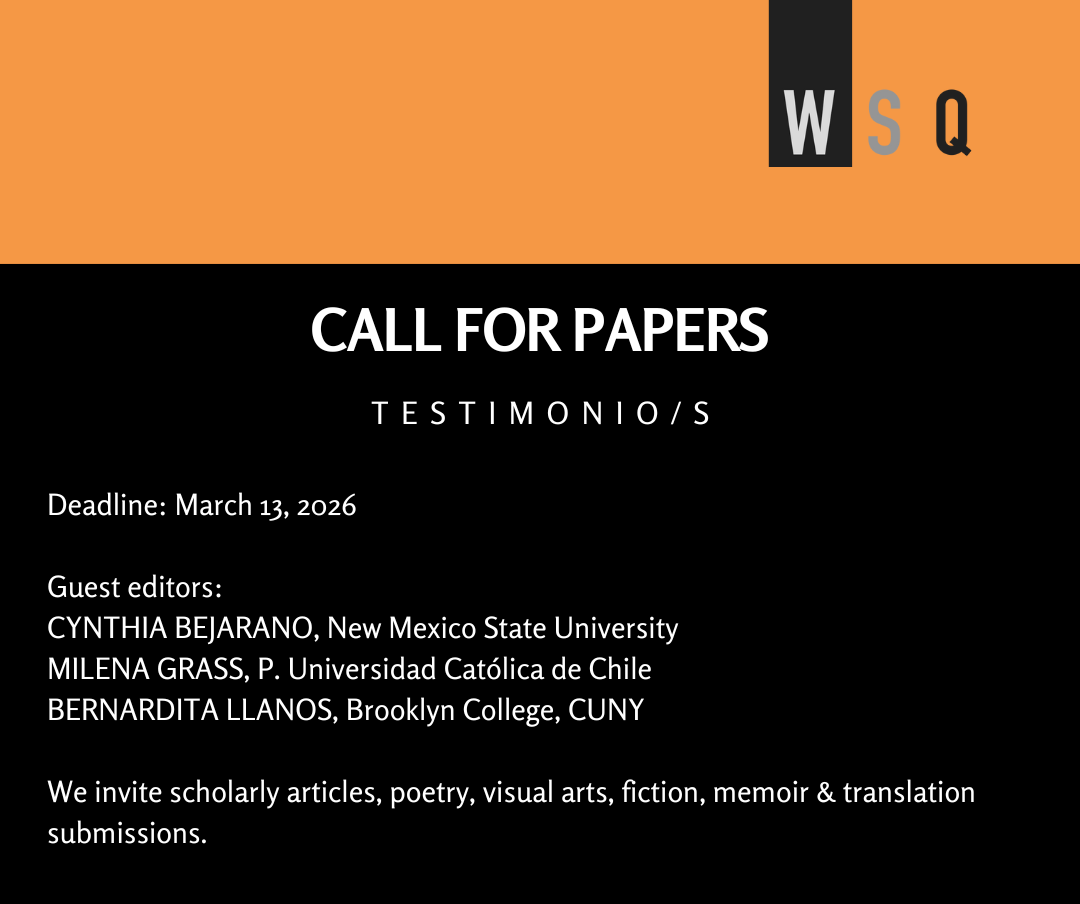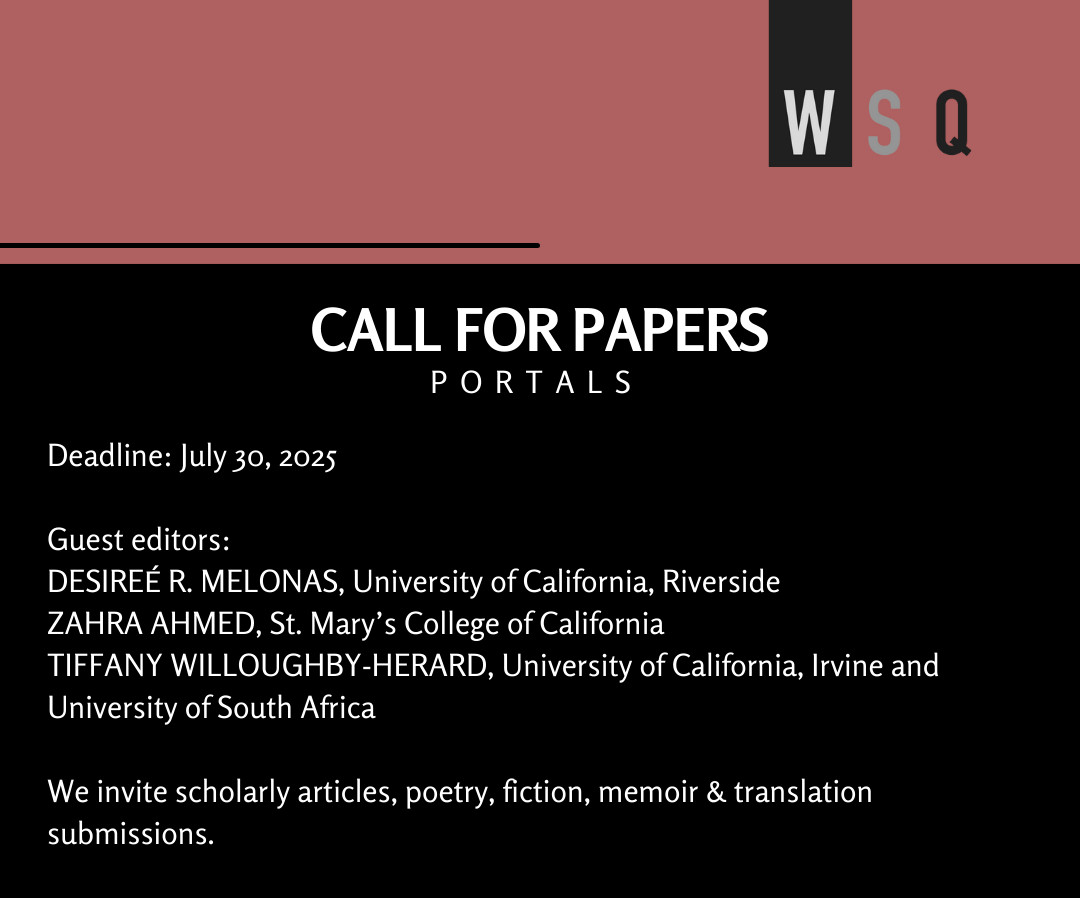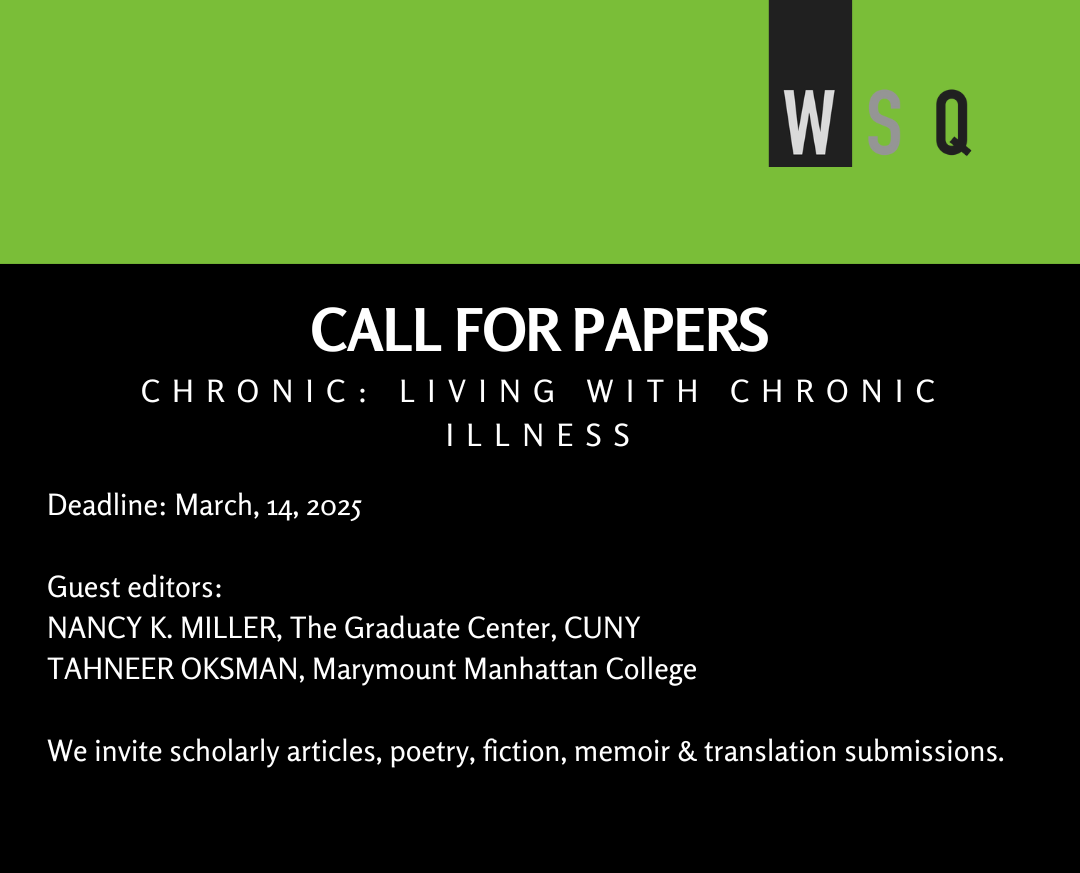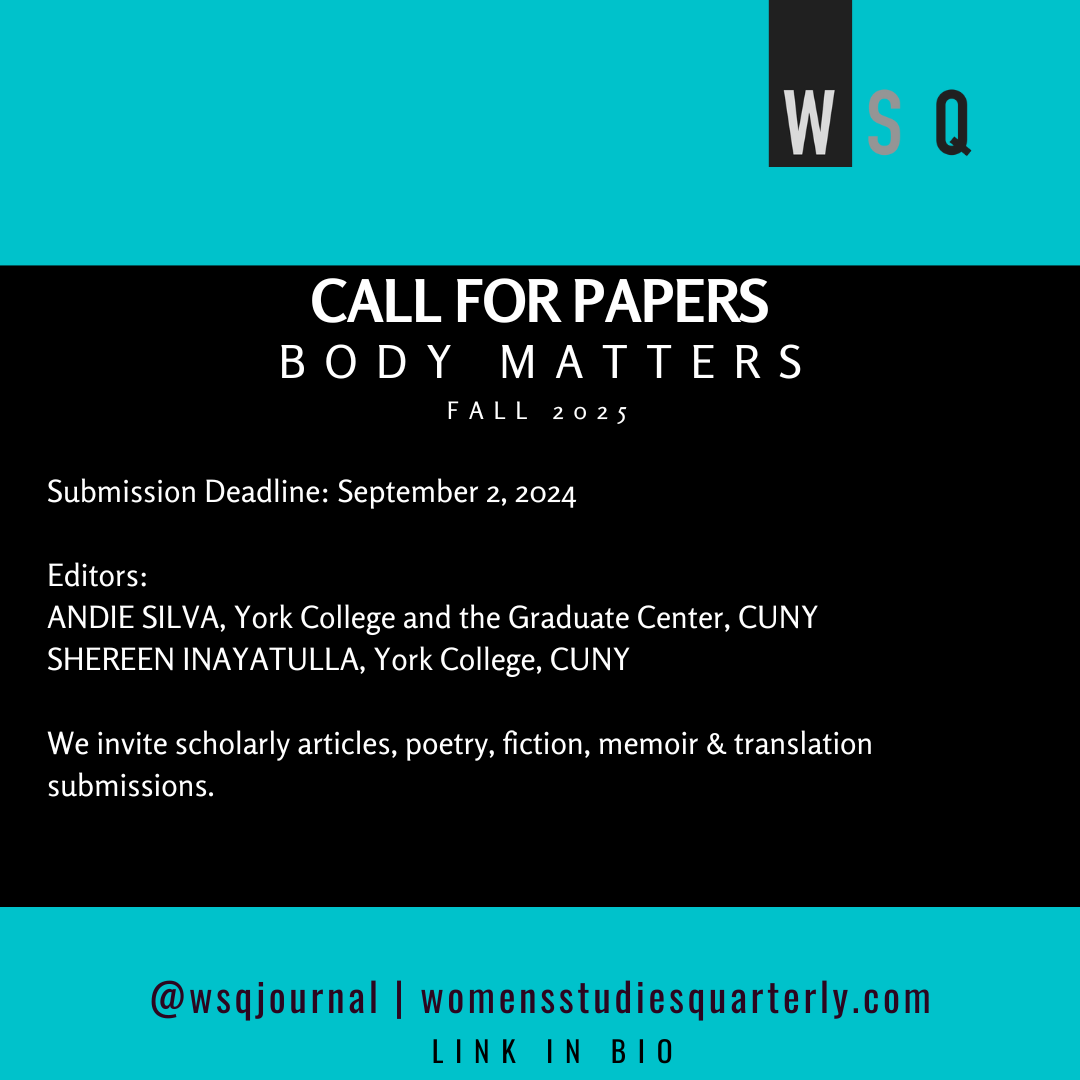
As a partner of Women Studies Quarterly (WSQ), the Center for the Humanities is excited to share this call for papers for a special WSQ issue Nonbinarywhich will be co-edited by JV Fuqua, (Queens College, CUNY), Marquis Bey, (Northwestern University), Red Washburn (Kingsborough Community College, CUNY), and Brianne Waychoff (Borough of Manhattan Community College, CUNY), in collaboration with WSQ‘s publisher The Feminist Press and fellow partner The Center for the Study of Women and Society at The Graduate Center CUNY,.
Submission Deadline: October 31, 2022
This special issue of WSQ reflects upon the work that the word “nonbinary” does in terms of unsettling the codes of gender, sexuality, race, and other categories of being and knowing. For this issue, we understand “nonbinary” to serve as a direct challenge to the tenacity of binary logics, ethics, and orientations. Not only located in, but perhaps most recognizably found in discussions of gender and sexuality, nonbinary must be thought in relation to deep conceptions of identity and belonging across the spectrum of power and difference. Feminist theory has long focused upon the problematic aspects of binary thinking whether in relation to the dyads of nature/culture, sex/ gender, biology/culture, human/nonhuman, or the individual/collective. Currently, in the midst of the Covid-19 pandemic, we see the consequences of nonbinary thinking as it relates to fact/fiction and the schisms in public discourse and everyday life. Nonbinary directs attention to the power and the sometimes precarious status of ways of being, knowing, and doing that fall outside such normatively derived epistemological, structuring pairs.
In 2008, WSQ published Trans-, its first issue devoted to the subject of “transing” (Styker, Currah, Jones) gender, the human/nonhuman divide, region, power, and racialized identities. During the following twelve years, the popular media landscape has had a veritable explosion of images and narratives of nonbinary ways of being. From performer Billy Porter, to writer, artist, and activist Alok Vaid-Menon, to Billions actor Asia Kate Dillon, nonbinariness now circulates through popular culture and podcasts with a speed that can be surprising. However, in feminist, critical race, postcolonial, and queer theory, the nonbinary continues to receive, in the best cases, an inclusive nod in discussions of trans- or, in the worst cases, disregard. This is not to say that in all trans- work, nonbinary must be parsed. It is, rather, to acknowledge that nonbinary needs to be considered for its relationality to trans- as well as for its differences from, and challenges to, that concept, along with intersecting identities of race, class, sexuality, ethnicity, ability, age, and religion, etc. We, as guest editors, ask how it is the case that nonbinary representations and narratives circulate through culture, why it is the case that nonbinariness and its intersections with other identities continues to be overlooked in relation to LGBTQIA+, feminist theory, critical race, postcolonial, and, specifically, trans studies, and how we can resist binary ideologies and practices to reposition nonbinary as the intentional practice of freedom. Nonbinary, in short, might be a way to enact, finally, feminist life—life unbeholden to normative, circumscriptive impositions that stem, in no small part, from heteropatriarchy.
LIST OF POSSIBLE TOPICS:
- How might nonbinary be theorized and historicized?
- What is the relation of nonbinary to trans?
- What are the legacies of feminist, critical race, postcolonial, and queer theory and critique in contemporary nonbinary issues?
- What is feminist about nonbinary?
- How do texts and performances of nonbinariness challenge and/or reconfigure transness?
- “Trans” may not necessarily be nonbinary in orientation or understanding: What are the implications of this recognition? How do nonbinary bodies and bodies of knowledge transcend space?
- How does nonbinary reposition genderqueerness in the canon and archives?
- What does it mean to go “across” and “against” identities, bodies, borders, disciplines, genres, translations, and states?
- How do untranslatable states of nonbinary open up possibilities in trans studies?
- In what ways can gender outlaws and outlaw genres coexist together?
- How can we talk about the connections between borders, binaries, and bodies?
- How do we challenge traditions of singularity, homogeneity, and monolithicity in identity, study, and society?
- How can nonnormativity, unbelongingness, and unassimilation be a form of freedom under statesanctioned colonialism, racism, ethnocentrism, sexism, and cissexism?
- How do we envision gender self-determinations and genre reimaginations as part of a radical conversation?
- How do we discuss unpersonhood/dehumanization, uncertainty/precarity, dislocation/displacement, rejection/ejection, and homelessness/exile as binary problems?
- What does it mean to be at home in one’s body and in society without binary logic and laws?
- How are binaries part of a white supremacist and colonial project?
- What is your nonbinary vision for a utopia or a world without carceral systems, systems of white supremacy, cissexist patriarchy, colonialism, and capitalism?
Submissions Guidelines
Submission Deadline: October 31, 2022
- Scholarly articles should be submitted to WSQ.submittable.com. Please send complete articles, not abstracts. Please remove all identifying information from the file uploaded to Submittable. We will give priority consideration to submissions received by September 15, 2022. LGBTQIA+, disabled, Black, Indigenous, and people of color are especially encouraged to submit.
- Submissions should not exceed 6,000 words (including un-embedded notes and works cited) and should comply with the formatting guidelines at https://www.feministpress.org/… . For questions, please email the guest issue editors at [email protected].
- Poetry submissions related to the issue theme should be submitted to WSQ.submittable.com. Please review previous issues of WSQ to see what type of submissions we prefer before submitting poems. Please note that poetry submissions may be held for six months or longer. Simultaneous submissions are acceptable if the poetry editor is notified immediately of acceptance elsewhere. We do not accept work that has been previously published. For questions related to poetry submissions, please email the WSQ’s poetry editor at [email protected].
- Fiction, essay, memoir, and translation submissions related to the issue theme between 2,000 and 2,500 words should be submitted to WSQ.submittable.com. Please review previous issues of WSQ to see what type of submissions we prefer before submitting prose. Please note that prose submissions may be held for six months or longer. Simultaneous submissions are acceptable if the prose editor is notified immediately of acceptance elsewhere. We do not accept work that has been previously published. For questions related to creative prose submissions, please email [email protected].
ABOUT WSQ: Since 1972, WSQ has been an
interdisciplinary forum for the exchange of emerging perspectives on
women, gender, and sexuality. Its peer-reviewed interdisciplinary
thematic issues focus on such topics as Asian Diasporas, Protest, Beauty, Precarious Work, At Sea, Solidarity, Queer Methods, Activisms, The Global and the Intimate, Trans-, The Sexual Body, and Mother,
combining legal, queer, cultural, technological, and historical work to
present the most exciting new scholarship, fiction, creative
nonfiction, poetry, book reviews, and visual arts on ideas that engage
popular and academic readers alike. WSQ is edited by Brianne
Waychoff (Borough of Manhattan Community College, CUNY) and Red Washburn
(Kingsborough Community College, CUNY) and published by the Feminist
Press at the City University of New York. Visit
http://www.feministpress.org/w… .
